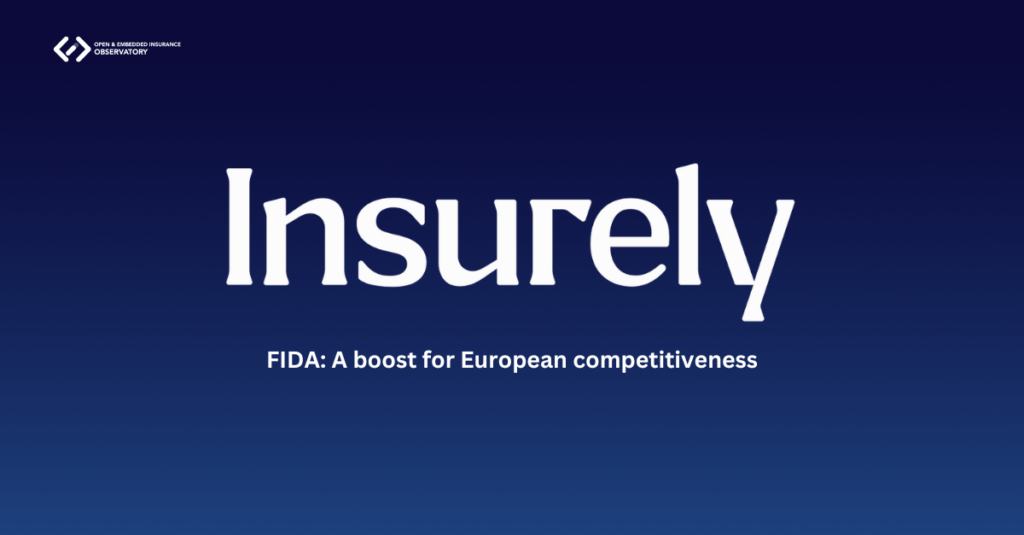Source: Insurely
This initiative marks a shift toward a more dynamic, data-driven financial ecosystem, creating a level playing field across Europe. With easier access to financial data and smoother operations, companies will be better positioned to offer cutting-edge services—position Europe as a global leader in financial technology.
Driving innovation and competition in financial services.
FIDA extends the principles of open banking to a wider range of financial services, allowing for secure and efficient data sharing. With access to richer datasets, financial services companies can develop personalized products that better meet consumer needs. In turn, consumers will gain greater control over their data, benefit from more tailored financial offerings, and enjoy improved pricing and competition among financial institutions.
This shift will make the European financial sector more competitive, particularly against BigTech companies, which have traditionally offered a superior customer experience compared to EU alternatives. Additionally, non-EU companies operating in Europe may find it harder to compete, as new data-sharing requirements could act as a barrier to entry for these data-heavy companies. Ultimately, open finance benefits both consumers and businesses while strengthening Europe’s data economy in a way that fosters innovation. FIDA also plays a crucial role in leveling the playing field for smaller markets, ensuring they have the same opportunities and transparency as larger ones. This approach promotes a more balanced and inclusive financial ecosystem across the region.
Positioning Europe as a global leader in financial technology.
FIDA closely aligns with the objectives of the Capital Markets Union (CMU) by deepening financial integration and enhancing cross-border investment within the EU. A well-structured open finance framework enables seamless access to financial data, improving transparency, efficiency, and competition in capital markets. By proactively establishing a comprehensive open finance framework, the EU is positioning itself as a global benchmark for financial innovation. This leadership not only strengthens Europe’s international standing but also provides its financial institutions with a competitive edge in developing cutting-edge technologies and services.
FIDA will also foster the growth of EU-wide fintech companies, enabling them to compete with their U.S. and Chinese counterparts, which benefit from access to large, unified markets. Currently, European fintech firms often scale within regional spheres but struggle to compete on a global level. With FIDA, they will gain the tools needed to expand more effectively, driving innovation and strengthening Europe’s financial ecosystem.
Attracting investment and top talent.
A strong open finance framework enhances Europe’s appeal to investors and skilled professionals. Transparent and consistent regulations minimize risks, lower compliance costs, and make scaling across multiple markets easier. By eliminating regulatory fragmentation, FIDA makes Europe a more attractive place to do business.
Additionally, clear rules on data security, privacy, and interoperability foster consumer trust and market integrity. This enables businesses to develop innovative financial services while ensuring they remain compliant with legal requirements. As Europe’s financial sector grows more competitive and technologically advanced, it will become a global hub for fintech innovation, drawing in top talent looking for opportunities in well-regulated, dynamic markets.
The need for urgency.
With rapid technological advancements and increasing global competition, implementing FIDA quickly is crucial. Delaying its rollout could see Europe falling behind regions that are rapidly adopting open finance models, putting local firms at a disadvantage. Non-EU companies could outpace European competitors and provide a better customer experience, leading to more EU consumers turning to foreign services.
By acting now, Europe can harness the benefits of a unified financial data space, driving economic growth and ensuring its financial institutions remain competitive on the world stage. The European Commission has emphasized that FIDA will improve financial literacy and prioritize consumer interests, competition, security, and trust—making timely action all the more essential.
In conclusion, FIDA represents a strategic initiative to invigorate Europe’s financial sector. By fostering innovation, attracting investment and talent, and asserting global leadership in financial technology, FIDA is poised to significantly enhance European competitiveness in the evolving digital economy.


